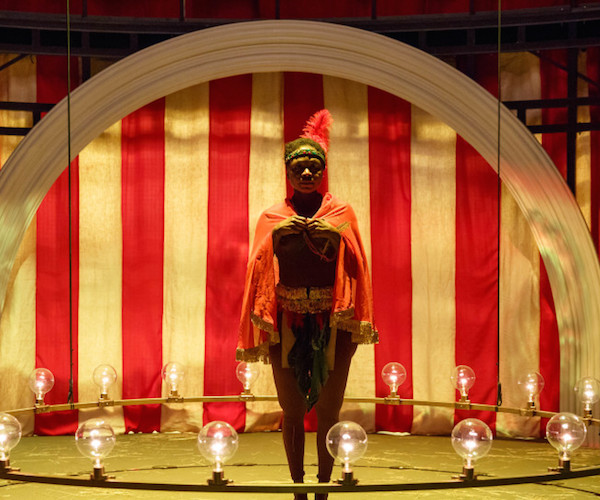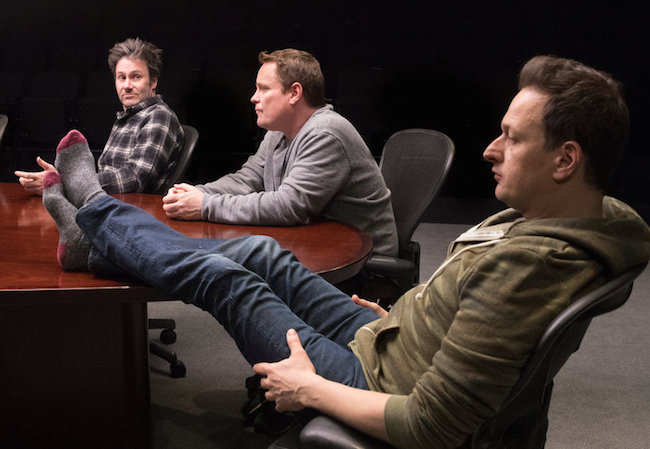New York Theater Review: Storytime — “Venus” and “The Antipodes”
Two plays from major American dramatists interrogate how we come up with the stories we tell about ourselves.
Venus by Suzan-Lori Parks (through June 4) and The Antipodes by Annie Baker (through June 11), both at The Signature Theatre in New York City.

A scene from the Signature Theatre production of “Venus.” Photo: Joan Marcus.
By Tim Jackson
Two plays currently at the Signature Theatre in New York sport ambiguously mythological titles and delve into the creation of stories and myths from wildly divergent perspectives. Venus is the disturbing tale of the “Venus Hottentot” a Khoikhoi African women exploited because of her exaggerated anatomy at freak shows in London in the early 1800’s. Of particular interest to the onlookers– her steatopygia, or enormous buttocks. Based on the true story of Saartjie Baartman, Suzan-Lori Parks’s script looks at her protagonist’s plight from a number of feminist/racial vantage points: mythological, sociological, political, romantic, and scientific. In Annie Baker’s The Antipodes, a committee of professional storytellers is commissioned to generate a profitable story for a corporate entity. The drama is a satire — taken to the point of surreal exaggeration — of the nature of commercial storytelling in an age whose art (from theater and film to virtual reality) is drowning in stories.
Venus is told chronologically and staged with a multiracial chorus in powdered wigs commenting on, as well as singing and performing in, a melodramatic Restoration style comedy sparked by the travails of marriage and romance. This showbiz chorus also comments on the action, providing historical context and continuity. In this way, Parks uses Baartman’s plight to look at the contradictions of history and popular culture as well as the exploitation and objectification of the black body. At one point, there is a disturbing description of how the ‘Hottentot’s’ physiological traits proved fascinating to scientists and appealing to white men’s lust. Having been displayed as a less-than-human physical anomaly, she was eventually driven to prostitution and died at the age of twenty-five. Her corpse was cast in plaster and then dissected. Her body parts and skeleton were on display until the mid-1970’s.
Saartjie, or Sarah, Baartman has become a rallying cry against the male exploitation of the female body. Are performers themselves, twerking and displaying themselves, somehow part of the same objectifying process? As with Topdog/Underdog and The Death of the Last Black Man in the Whole Entire World, Venus uses theatricality as means to interrogate the moral satisfactions of theater. Topdog is about two black brothers traumatized by the past. Both men are hustlers and gamblers, but the sharp dialogue (with the syncopation of jazz) puts them a positive light. (The script was brilliantly staged at the Huntington Theatre Company this season). The Death of the Last Black Man, originally staged in 1990, uses a parade of historically black stereotypes in what has been called a “fugue” style to interrogate contemporary perceptions of black identity.
Venus is similarly impressionistic. Its premiere was directed by Richard Foreman in 1996. He said of the experience that Venus is “the kind of theater I like, a slightly cerebral circus; I’m interested in the theater as a pageant, as a spectacle.” This new production taps into Forman’s comic-philosophical approach but, as directed by Lear Debessonet, the play’s themes are delineated though various performance styles, from naturalistic and choral to performative. In this interpretation, love triumphs over tragedy. African-British actress Zainab Jah as Baartman dons a full body suit at the start of the show in full view of the audience. This realistic looking second skin can’t hide the actress’s delicacy, intelligence, and goodness. Documents suggest that Baartmen, too, exhibited an inspiring humanity despite her life’s agonizing circumstances. The troubling questions this tragedy opens up are no less relevant today than they were decades ago.

A scene from “The Antipodes” at Signature Theatre. Photo: courtesy of the Signature Theatre.
Annie Baker’s The Antipodes takes a dim view of corporate (mostly male) storytelling. In contrast to the set design (filled with objects and architectural details) for her previous play, John, this script demands a single oblong conference table. Around it sits a group of writers, six men and one woman, who attempt to generate stories for an unknown movie studio: their only caveat — “no dwarves, no elves, no trolls.” Where do stories come from? The group is afflicted with writer’s block. Head writer Sandy (what a passionless name!) attempts to break out of the creative cul-de-sac by asking each participant relate some personal experiences. Played by the great Will Patton, Sandy comes off as calm — yet aggressive and threatening. Almost all the initial anecdotes involve sex and conquest. The narratives are graphic, gross, and entirely inappropriate. The only woman, Eleanor, introduces the idea of love. One less aggressive writer named Danny (there are two Dannys, both played by actors named Danny) tells an odd tale about a chicken and then declares his discomfort with mixing up his life with his stories. He is called out of the room and never returns. The wayward group of writers is played by a marvelous ensemble cast, including Brian Miskell as a silent and bizarre note taker; Josh Charles and Josh Hamilton both exude acutely delusional self-confidence.
The group fails to generate anything worthwhile. Each new day is indicated by the entrance of Will’s secretary, Sarah, whose outfit changes each time she enters. At one point, she is asked by the group to tell a story; she relates a tale that leaves them all but speechless. Nicole Rodenburg plays Sarah, and she gives Sandy’s faithful and ditzy Gal Friday plenty of valley girl upspeak and vocal fry. The actress is so hilarious that the performance draws spontaneous applause. In fact, she plays the only character in the play that generates a coherent narrative.
But the others are in there trying. Attempts to come up with ideas often descend into the unreal. The gamut of variations on storytelling is parodied. Evenings descend into chaos and emptiness. And what does this have to do with the antipodes? At one point, a character launches into a rambling comic dissertation on the geographical meaning and ontology of antipodes and the universe. Somehow, the word (pronounced with an emphasis on the middle syllable i.e. Antigone) comes off sounding as if it is part of a faux mythology. The dictionary definition of antipodes is “the exact opposite or contrary” or “parts of the earth diametrically opposite.” In the hands of Annie Baker, opposites attract but never meet — they seem to run by one another and end up in the void.
Tim Jackson was an assistant professor of Digital Film and Video for 20 years. His music career in Boston began in the 1970s and includes some 20 groups, recordings, national and international tours, and contributions to film soundtracks. He studied theater and English as an undergraduate, and has also has worked helter skelter as an actor and member of SAG and AFTRA since the 1980s. He has directed three feature documentaries: Chaos and Order: Making American Theater about the American Repertory Theater; Radical Jesters, which profiles the practices of 11 interventionist artists and agit-prop performance groups; When Things Go Wrong: The Robin Lane Story, and the short film The American Gurner. He is a member of the Boston Society of Film Critics. You can read more of his work on his blog.
Tagged: Annie Baker, Signature Theatre, Suzan-Lori-Parks, The Antipodes
